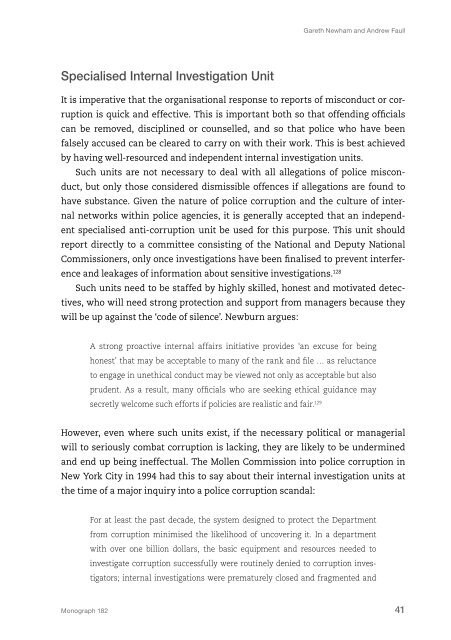Protector or predator? - Institute for Security Studies
Protector or predator? - Institute for Security Studies
Protector or predator? - Institute for Security Studies
Create successful ePaper yourself
Turn your PDF publications into a flip-book with our unique Google optimized e-Paper software.
Gareth Newham and Andrew Faull<br />
Specialised Internal Investigation Unit<br />
It is imperative that the <strong>or</strong>ganisational response to rep<strong>or</strong>ts of misconduct <strong>or</strong> c<strong>or</strong>ruption<br />
is quick and effective. This is imp<strong>or</strong>tant both so that offending officials<br />
can be removed, disciplined <strong>or</strong> counselled, and so that police who have been<br />
falsely accused can be cleared to carry on with their w<strong>or</strong>k. This is best achieved<br />
by having well-resourced and independent internal investigation units.<br />
Such units are not necessary to deal with all allegations of police misconduct,<br />
but only those considered dismissible offences if allegations are found to<br />
have substance. Given the nature of police c<strong>or</strong>ruption and the culture of internal<br />
netw<strong>or</strong>ks within police agencies, it is generally accepted that an independent<br />
specialised anti-c<strong>or</strong>ruption unit be used f<strong>or</strong> this purpose. This unit should<br />
rep<strong>or</strong>t directly to a committee consisting of the National and Deputy National<br />
Commissioners, only once investigations have been finalised to prevent interference<br />
and leakages of inf<strong>or</strong>mation about sensitive investigations. 128<br />
Such units need to be staffed by highly skilled, honest and motivated detectives,<br />
who will need strong protection and supp<strong>or</strong>t from managers because they<br />
will be up against the ‘code of silence’. Newburn argues:<br />
A strong proactive internal affairs initiative provides ‘an excuse f<strong>or</strong> being<br />
honest’ that may be acceptable to many of the rank and file … as reluctance<br />
to engage in unethical conduct may be viewed not only as acceptable but also<br />
prudent. As a result, many officials who are seeking ethical guidance may<br />
secretly welcome such eff<strong>or</strong>ts if policies are realistic and fair. 129<br />
However, even where such units exist, if the necessary political <strong>or</strong> managerial<br />
will to seriously combat c<strong>or</strong>ruption is lacking, they are likely to be undermined<br />
and end up being ineffectual. The Mollen Commission into police c<strong>or</strong>ruption in<br />
New Y<strong>or</strong>k City in 1994 had this to say about their internal investigation units at<br />
the time of a maj<strong>or</strong> inquiry into a police c<strong>or</strong>ruption scandal:<br />
F<strong>or</strong> at least the past decade, the system designed to protect the Department<br />
from c<strong>or</strong>ruption minimised the likelihood of uncovering it. In a department<br />
with over one billion dollars, the basic equipment and resources needed to<br />
investigate c<strong>or</strong>ruption successfully were routinely denied to c<strong>or</strong>ruption investigat<strong>or</strong>s;<br />
internal investigations were prematurely closed and fragmented and<br />
Monograph 182 41

















